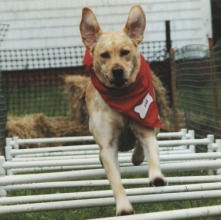
Obesity, defined as an increase in body weight at least 15% above what would be normal for the size of the pet, is a medical problem. Proper diet and exercise can help significantly. Any program must begin with a veterinary visit to make sure that other problems that contribute to weight gain, such as hypothyroidism or diabetes mellitus, are not present. Assuming that the obesity is simply a result of increased caloric intake, the following ideas can be beneficial for most overweight pets.
Diet
There’s no question that weight loss can only occur when less calories are taken into the body than the animal requires. This means some type of low calorie diet is an important first step in reducing weight. There’s a lot of debate about what is the “best” diet. I believe homemade diets are the best because pet owners control every ingredient in the diet. If preparing a homemade diet is not possible, a veterinary-prescribed diet is my next choice. “Lite” foods purchased at pet and grocery stores have too many calories in them for most pets that are trying to lose weight, and many of these diets contain potentially harmful by-products and chemicals. Feeding your pet small frequent meals (snacks) works best to prevent hunger pangs and burn off additional calories.
Exercise
A sensible program of moderate exercise will burn off calories and decrease
appetite. Your doctor can prescribe an exercise program that fits your pet’s needs.
Supplements
While no supplement functions as a magic pill, the following supplements may help as part of an overall weight loss program.
1. Hydroxycitric Acid – suppresses hunger in people and helps prevent the body from turning carbohydrates into fat by inhibiting the ATP-citrate lysase enzyme.
2. Chitosan – a dietary supplement made from the outer skeletons of shellfish. The product is purported to bind to fat in the intestines, preventing the absorption of fat.
3. Coenzyme Q-10 – used to transport and break down fat into energy. Consult with your doctor about using this supplement to help in a weight reduction program for your pet.
4. Herbs – such as cayenne, mustard, and ginger increase metabolism in people and may also do the same in pets. Your doctor can prescribe a safe dose of these herbs if she feels they might help your pet.
Regardless of how helpful supplements may be, they are no substitute for a lifestyle change. Properly feeding and exercising your pet, especially from puppyhood and kittenhood, are the most important factors in weight management. Since obesity is a medical problem, work with your veterinarian to determine the best course of action for your pet.
Homemade Diets for Dogs and Cats, adapted from The Natural Health Bible for Dogs & Cats, Shawn Messonnier, DVM Prima, 2001.
Weight Control Diet for Adult Dogs
1/2 pound of cooked chicken
2 cups of cooked long grain rice
1/4 tsp salt or salt substitute
Vitamin/Mineral supplement
This diet provides approximately 624 kcal, 49.4 gm of protein, and 4.7 gm of fat. It supplies the daily caloric needs for weight loss in a 45-50 pound dog.
This diet supplies the calories required for weight reduction in a dog that normally weighs 47-48 pounds (non-obese weight.) In other words, it should be fed to a dog that weighs more than 47-48 pounds but whose ideal weight would be approximately 47-48 pounds.
Weight Control Diet For Adult Cats
5 ounces salmon, canned with bone (low-salt)
1/3 cup rice, long grain, cooked
1/4 tsp salt or salt substitute
Vitamin/Mineral supplement
This diet provides 284 kcal, 30.2 gm of protein, and 10.4 gm of fat. Feed 75% of this recipe to a cat that would normally weigh 11 pounds, 67% to a cat that would normally weigh 10 pounds, and 60% to a cat that would normally weigh 9 pounds.
For the Best that Pet Lifestyle and Animal Welfare has to offer follow Wendy Diamond on Facebook, Twitter, and right here at AnimalFair.com!
